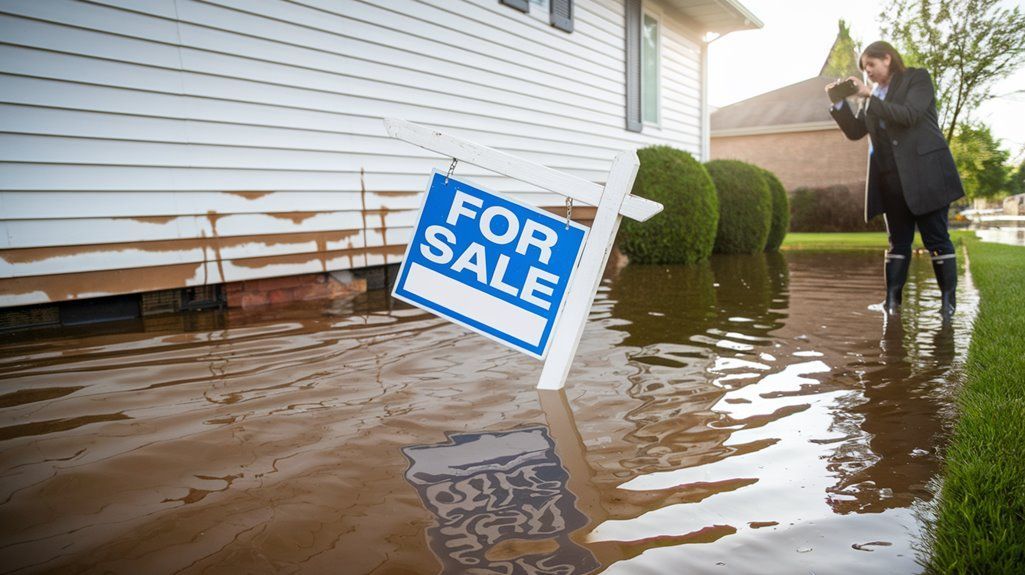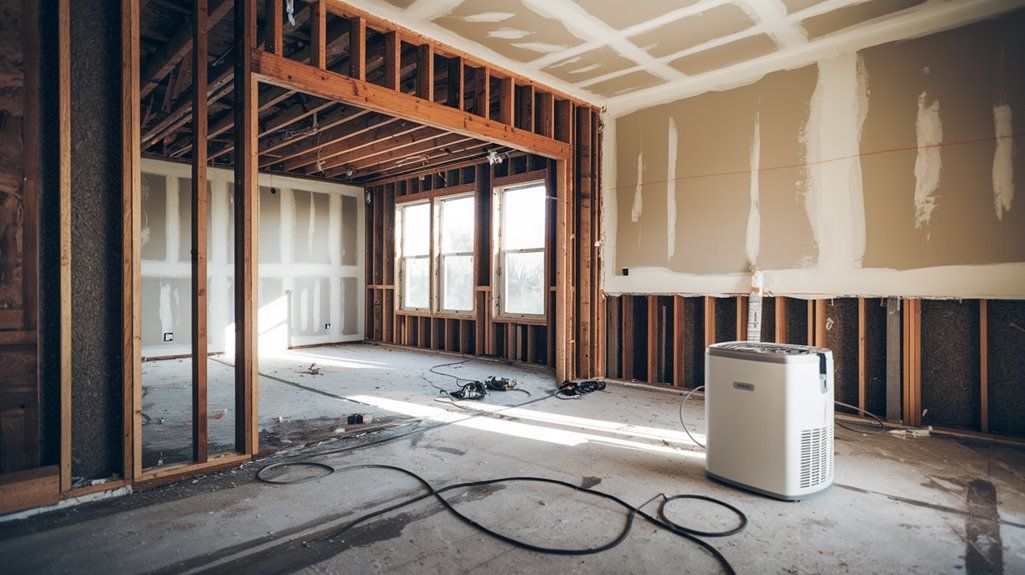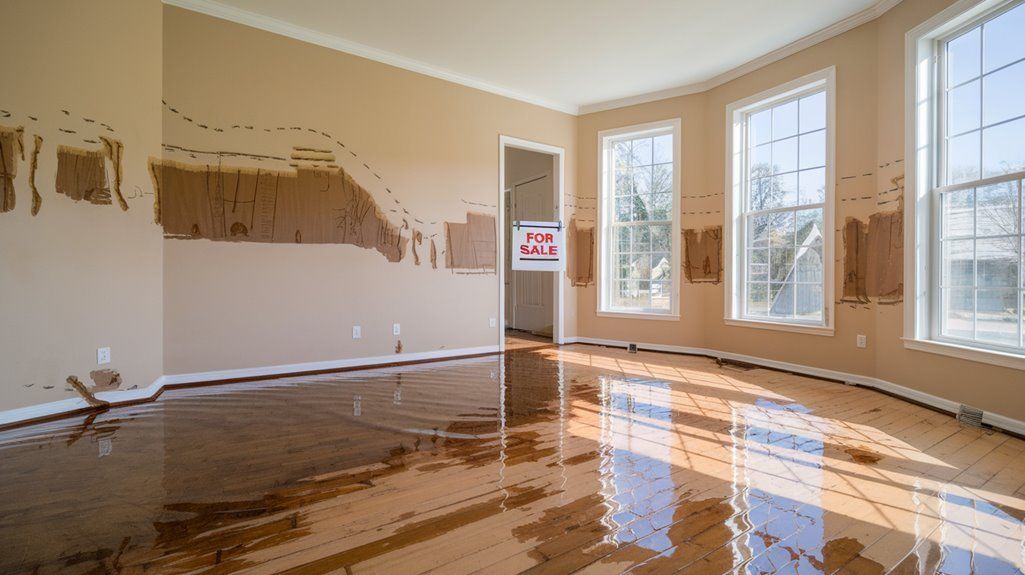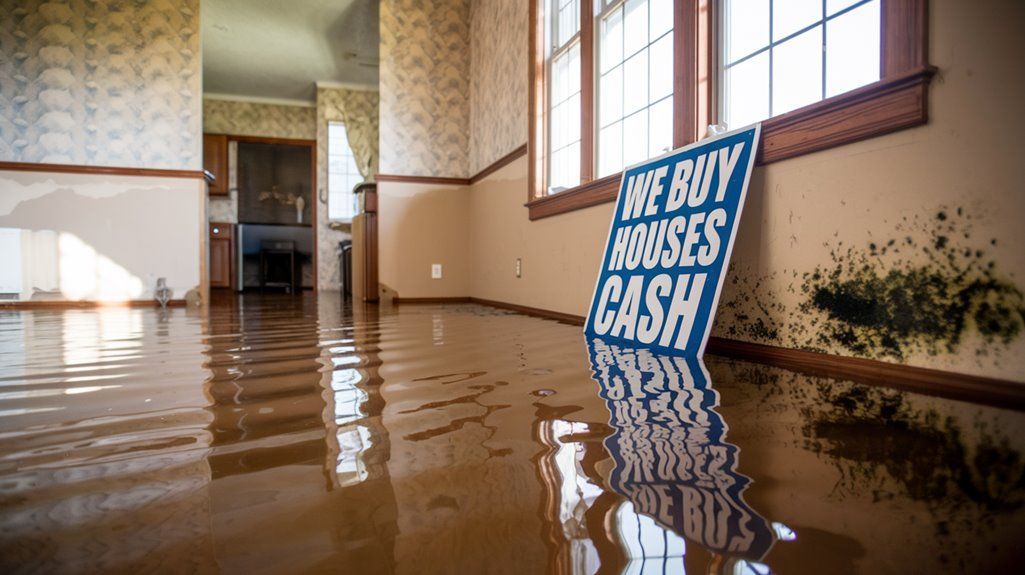How to Sell a House That Has Flooded

Selling a flood-damaged house creates significant stress for homeowners facing property devaluation and market challenges. You must deal with insurance claims, repairs, and buyer concerns while trying to get a fair price.
This situation affects thousands of property owners each year, leading to financial uncertainty. Your worries about disclosure requirements and repair costs can feel overwhelming.
While buyers might hesitate due to flooding history, market conditions add extra pressure. You may wonder if selling the property is even possible in its current state.
You can sell a flood-damaged house by addressing repairs, maintaining transparency, and working with experienced professionals. This guide will walk you through practical steps to overcome flooding challenges and secure the best possible sale price.
Key Takeaways
- Document all flood damage with photos, inspection reports, and insurance claims to provide transparency and build trust with potential buyers.
- Set a competitive price that accounts for damage extent, with flooded homes typically selling 20-30% below fully repaired properties.
- Consider selling to cash home buyers who specialize in damaged properties for faster closings and as-is purchases.
- Disclose all previous flood history and damage to comply with legal requirements and avoid future lawsuits.
- Provide detailed repair cost estimates to help buyers understand the investment needed to restore the property.
What Should You Know About Flooded Homes?
Flooded homes present serious risks and challenges for property owners and potential buyers. You must check both obvious and hidden water damage in these properties. The damage can spread to walls, floors, and support beams. Water often leads to dangerous mold growth behind walls. If proper repairs aren’t done, electrical systems could fail.
Insurance claims from floods will affect the property’s market price. So, you should keep records of all flood incidents and repairs. Buyers need to know about previous flooding before making a purchase. Professional inspectors can spot water-related problems that regular eyes might miss.
We recommend getting special flood damage inspections before buying such properties. This step helps buyers understand repair costs and future risks. Local laws require sellers to tell buyers about past flooding issues. If sellers hide flood history, they could face legal trouble later.
How Can You Assess Flood Damage?
You must inspect your property visually to start assessing flood damage properly. Take clear photos of water marks, structural problems, and damaged materials throughout your home. You should check moisture levels in walls, floors, and ceilings with special tools.
We recommend breaking down your inspection into specific areas for better organization. If you examine the foundation first, you can spot major structural issues early. You will need to assess electrical systems, plumbing, and HVAC units thoroughly. Since mold grows quickly after floods, check walls and surfaces within two days. This inspection must include testing load-bearing walls for stability signs.
When dealing with complex damage, professional help becomes essential for accurate assessment. You should contact certified experts for electrical and structural evaluations right away. These specialists will provide detailed reports for your insurance claims. If you plan to sell the property, their documentation will meet disclosure requirements.
Should You Repair the Home Before Selling?

Home repairs before selling depend on many key factors that affect your final sale price. You must carefully compare repair expenses against possible returns on your investment. This analysis helps determine the best financial choice for your situation. Homes with damage often sell for 20-30% less than fixed-up properties.
We suggest starting with critical systems if you decide to make repairs. Your first priorities should include electrical, plumbing, and HVAC systems. These improvements will show buyers that you maintained the property well. If repair costs are more than half the home’s value, selling as-is becomes a better option.
Market conditions play a vital role in this decision. You might attract competing investors in a strong seller’s market. When the market favors buyers, you need more repairs to interest typical homebuyers. Hence, your local market should guide your choice.
If you evaluate all these factors carefully, you can make the right decision. So take time to research your options and local trends. While some repairs increase value significantly, others may not justify their cost.
When repairs might not be worth it
Repairs for flood damage are not always a wise financial choice. You should evaluate several key factors before investing in renovations. The cost of repairs must stay below 50% of your home’s value before flooding. If repair expenses go higher, you will lose money on the investment.
Market conditions play a crucial role in repair decisions. This is because weak housing markets limit value gains from improvements. You must check if your property sits in a flood-prone area. Properties in high-risk flood zones face ongoing insurance challenges and low buyer interest.
We see many neighborhoods lose value after repeated flooding incidents. If your area shows this pattern, expensive repairs may never pay off. When structural damage requires major rebuilding, selling as-is becomes more practical.
Local building codes can force costly elevation work on flood-damaged homes. Since these requirements add significant expenses, some owners choose to sell instead.
How Does Flood Damage Affect Property Value?
Flood damage causes property values to drop between 15-25% after severe water-related incidents. This decline results from actual damage and concerns about future flooding risks.
Your home’s flood records will stay in public databases forever. Insurance companies and property inspectors can easily access these flood histories. If you plan to sell, buyers’ lenders will need proof of flood insurance coverage.
Several factors determine how much value a property loses after flooding. Properties in high-risk zones face more severe price drops than others. You can protect your investment by installing flood prevention systems. If you keep detailed records of repairs, your property might hold more value.
Is Disclosing Flood Damage Necessary?

Sellers must disclose previous flood damage to buyers in most states. This legal requirement varies across different regions. You can face lawsuits and penalties if you hide flood history from buyers. Federal law requires disclosure of property defects even without state-specific flood rules.
We recommend keeping detailed records of all flood-related incidents. You should include dates when flooding occurred and water damage levels. It is essential to document any repairs made after flood damage. This documentation must show insurance claims and steps taken to prevent future flooding. If you received federal aid for floods, you need to report it.
Since transparency helps build trust, buyers will appreciate honest disclosure. When sellers are open about flood history, they can better explain their property pricing.
If you follow these disclosure requirements, you will avoid legal troubles later. This honest approach creates a smoother selling process for everyone involved.
What Are Your Selling Options for Flooded Homes?
When selling a flood-damaged house, you’ll face two primary paths: a traditional sale through a real estate agent after completing repairs, or selling as-is to minimize your involvement.
Real estate investors often present an attractive option for as-is sales, as they typically purchase properties in any condition and can close quickly with cash offers. Your choice between these options will depend on factors like your timeline, repair budget, and desired final sale price.
Traditional sale vs. selling as-is
Homeowners must decide between traditional sale and as-is sale after flood damage. You will need to invest money upfront for a traditional sale approach. The restoration process demands complete flood repairs and structural fixes.
This path leads to higher returns in the market. If you choose this option, expect repair costs between $30,000 to $150,000. The entire process takes about three to six months to complete.
An as-is sale offers quick closure without any repair expenses. While you save on repairs, the final price will be lower than market value. This option attracts investors who specialize in property renovation. If you select an as-is sale, you could receive 20-40% below market price.
You can close the deal within two to three weeks. The buyers handle all repair responsibilities themselves. This approach eliminates ongoing costs like mortgage and insurance payments.
Real estate investor options
Real estate investors provide multiple options for selling flood-damaged properties quickly and efficiently. You can choose between different types of investors who specialize in buying damaged homes. These specialists understand the complexities of flood damage and offer competitive cash deals.
If you work with fix-and-flip investors, they will renovate and resell your property. While buy-and-hold investors focus on converting properties into rental units after repairs. This approach benefits sellers who need a fast closing without dealing with repairs. You should know that investors often have strong connections with reliable contractors.
When multiple properties face flood damage, wholesale investors step in to buy them together. So, this option might work well if your neighbors also want to sell. We recommend getting quotes from several investors to compare offers. If you take time to research investors, you will find the best deal for your situation.
How Can You Sell a Flooded House As-Is?
Selling a flooded house as-is lets you sell your damaged property quickly without repairs. You must complete flood inspections and settle insurance claims before listing your property.
These strategies will help you sell your flood-damaged home:
- You should set a competitive price based on damage and market trends
- We recommend taking clear photos of all water damage areas
- You must inform buyers about past floods and insurance claims
- This property will attract investors who buy damaged homes
- A detailed repair cost list will help buyers plan their budget
If you want to sell quickly, you will need to lower your asking price. While the final price might be lower, you can avoid repair costs. Since investors often buy damaged properties, they make excellent potential buyers. When you work with cash buyers, the process becomes faster. This approach helps you move forward without spending money on repairs.
Why Sell Your Flooded House to Cash Home Buyers?
Cash home buyers provide a practical solution for selling flood-damaged properties without hassle. They are experts at purchasing distressed homes and understand flood damage complications. You can skip mortgage approvals when dealing with these property investors. This means no lengthy appraisals or complex negotiations are needed.
If you choose cash buyers, your sale could close in just 7-14 days. They handle all the necessary paperwork and often pay the closing costs. You won’t need to worry about fixing or renovating your damaged property. This benefit becomes crucial when insurance doesn’t cover all repair expenses.
So, cash buyers offer a quick and simple way to sell your flooded house. While traditional buyers may avoid such properties, these investors welcome them. If your house has flood damage, cash buyers will still make fair offers. We understand that flood situations require fast solutions for homeowners.
Should You Consider Selling to Cash Home Buyers?

Cash home buyers offer a quick solution for homeowners who need to sell their properties fast. They provide immediate cash offers within two days of seeing your house. You might get less money than market value, but the speed can be worth it.
If you choose a cash buyer, you should consider these important benefits: This option eliminates the need for expensive home repairs. You can sell your house exactly as it stands today. The closing process is much faster than traditional home sales. It takes about one week instead of more than a month.
You will save money on real estate agent fees. Since there are no commissions, you keep more of the sale price. There won’t be any loan-related delays or conditions to worry about.
You can select when to close the deal. This flexibility helps you plan your move better. While the offer might be lower, the convenience often makes up for it.
If you need to sell quickly, cash buyers could be your best choice. When time matters more than maximum profit, this option becomes very attractive.
Benefits of Selling As-Is to Cash Home Buyers?
Cash home buyers offer significant savings when selling a flood-damaged house as-is. You can avoid repair costs ranging from $25,000 to $100,000 for flood restoration work.
This option eliminates realtor commissions, saving you 5-6% of the final sale price. When you choose cash buyers, property inspections and appraisals become unnecessary.
Water-damaged properties benefit greatly from quick cash sales. You won’t need to handle expensive mold removal or structural repairs. Cash buyers typically close deals within 7-14 days. Traditional sales, however, can stretch between 30-60 days. If you sell to cash buyers, your property won’t deteriorate further over time.
This speed helps reduce ongoing costs like insurance and property taxes. So you can avoid the hassle of managing multiple contractors. While working with cash buyers, you won’t need construction permits. Hence, you can skip the stress of coordinating repairs during flood recovery.
Sell Your Flood Damaged House As-is to Tulsa Home Buyers
Tulsa Home Buyers helps homeowners sell their flood-damaged houses across Oklahoma. We offer immediate cash purchases in Coweta, Bixby, Skiatook, Sapulpa, Glenpool, and Oklahoma City.
You can avoid the stress of dealing with flood insurance claims through our services. We make the selling process simple by eliminating lengthy home inspections and paperwork.
If your house has water damage, we will still buy it without any repairs. This means you won’t need to spend money on renovations or improvements.
Our process offers these key benefits:
- We buy houses as-is
- You skip all inspections
- We handle insurance matters
- You choose the closing date
- You get cash payment quickly
We understand the challenges of selling a flood-damaged property in Oklahoma. So, our team manages all paperwork and legal requirements for you. You can trust our local market expertise to provide a fair offer. If you need to sell fast, we can close the deal within days.
Our straightforward approach helps you move forward without delays. While traditional buyers may hesitate, we specialize in purchasing damaged properties. You will receive personalized support throughout the entire selling process. Hence, you can focus on planning your next steps with peace of mind.
Ready to work with Tulsa Home Buyers?
Let's connect! We’re here to help.
Send us a message and we’ll be in touch.
Or give us a call today at (918) 516-8951


